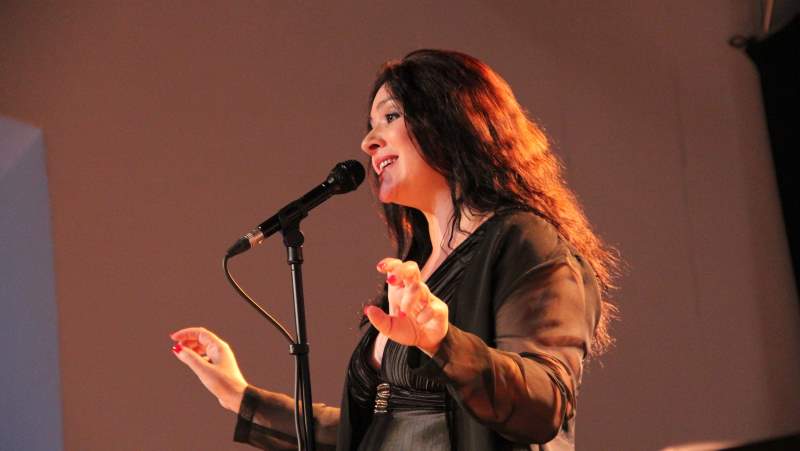Durme Querido Hijico is a traditional Sephardic song. Here is a beautiful version which is sung by the French-born Sephardic Jewish singer Françoise Atlan.
Durme Querido Hijico Lyrics
Ladino: Durme Querido Hijico
Durme kerido hijico,
durme sin ansia y dolor.
cerra tus lindos ojicos,
durme durme con savor.
de las fajas tu saliras
y a la skola tu iras.
i’aí! mi kerido hijico,
aleph bet ambezaras.
de la skola tu saliras
y a la plaça tu iras.
l’aí! mi kerido hijico,
mercancia ambezaras
de la plaça tu saliras
y a la estudio tu iras.
l’aí! mi kerido hijico,
cockoriko saliras.

Related: Yasmin Levy sings Adio Kerida
Spanish translation: Duerme, duerme querido hijito
Duerme, duerme querido hijito,
Duerme, duerme sin ansia ni dolor.
Cierra tus lindos ojitos,
Duerme, duerme con sabor.
Cierra tus lindos ojitos,
Duerme, duerme con sabor.
De la cuna saldrás,
Y a la escuela entraras,
Y tu allí mi querido hijito,
a leer tu aprenderás.
Y tu allí mi querido hijito,
a leer tu aprenderás.
Duerme, duerme querido hijito,
Duerme, duerme sin ansia ni dolor.
Cierra tus lindos ojitos,
Duerme, duerme con sabor.
Cierra tus lindos ojitos,
Duerme, duerme con sabor.
De la escuela saldrás,
(Una) novia hermosa tomaras,
Y (es) entonces querido hijito,
(que) criaturas tendrás.
Y (es) entonces querido hijito,
(que) criaturas tendrás.
English translation: Sleep, sleep, my beloved son
Sleep, sleep my beloved son
Sleep, sleep with no worries or pain.
Close your beautiful eyes,
Sleep, sleep favorably.
Close your beautiful eyes,
Sleep, sleep favorably.
From your crib, you’ll leave,
And to school, you’ll go
And it’s there my beloved son
That you’ll learn to read.
And it’s there my beloved son
That you’ll learn to read.
Sleep, sleep my beloved son
Sleep, sleep with no worries or pain.
Close your beautiful eyes,
Sleep, sleep favorably.
Close your beautiful eyes,
Sleep, sleep favorably.
From school, you’ll leave,
With a beautiful bride1 in hand,
And it’s then my beloved son
That you’ll have children of your own.
And it’s then my beloved son
That you’ll have children of your own.
Françoise Atlan
Born on July 27, 1964, Françoise Atlan is a French singer and ethnomusicologist whose work bridges the traditions of Sephardic Jewish music and a rich tapestry of Mediterranean sounds. Raised in a musical family in Narbonne, France, she inherited her passion for music from her mother, a pianist and lyrical singer, and began her musical journey at just six years old. Her father, a lawyer from Béjaïa, Algeria, contributed to her deep connection to the diverse cultures of the Mediterranean.
Atlan’s formal musical education began in the conservatories of Saint-Étienne and Aix-en-Provence, where she earned degrees in piano and chamber music. She later pursued musicology at Aix-Marseille University while honing her vocal skills at the Paris Opera School under Andréa Guiot. Her natural voice, rich with depth and authenticity, allowed her to excel in genres traditionally dominated by men, such as “nawbas,” and enabled her to explore a wide range of repertoires.

Her career has been marked by versatility and international acclaim. She sings everything from Sephardic romances in Ladino to Andalusian Arabic melodies, Occitan troubadour laments, and medieval European music. She has performed with artists like flamenco guitarist Juan Carmona, the Ensemble Gilles Binchois, and the Boston Camerata. Her performances have captivated audiences worldwide, from Morocco to Japan and the United States, showcasing her ability to seamlessly merge tradition and innovation.
Atlan is particularly celebrated for her interpretations of Sephardic romances, a repertoire deeply rooted in her Jewish heritage. Her meticulous research and respect for tradition have allowed her to bring an unmistakable authenticity to her performances. Her work delves into the musical intersections of Jewish, Muslim, and Christian communities, particularly in the Andalusian tradition, where shared cultural influences created a rich and harmonious musical legacy.
Throughout her career, Atlan has received numerous accolades. In 1987, she was awarded the Grand Prix de l’Académie Charles Cros for her performance of Maurice Ohana’s Cantigas. Her debut album, Romances Sefardies (1992), garnered critical acclaim, while her second album, Entre la Rose et le Jasmin (1994), earned the Diapason d’Or. In 1998, she was honored with the Prix Villa Médicis Hors les Murs, which supported her research into Arab-Andalusian music alongside Mohamed Briouel, resulting in the album Nawba M’Cherqi. She was named “Best World Music Artist” by Groupe Caisse d’Épargne in 2007.
Her work transcends music, serving as a bridge between cultures. In March 2019, Atlan was among three artists performing Jewish, Muslim, and Christian religious songs with the Moroccan Philharmonic Orchestra during Pope Francis’s visit to Morocco. In 2018, she became a Moroccan citizen by royal decree, further cementing her connection to the region.
Atlan’s teaching career reflects her commitment to preserving and sharing traditional music. She has conducted masterclasses at prestigious institutions like the Schola Cantorum in Basel and the Académie de Rabat, offering training in Sephardic and Arab-Andalusian music. Her role as a director of the Atlantic Festival of Andalusian Music in Essaouira, Morocco, highlights her dedication to fostering cultural exchange and celebrating the shared musical heritage of the Mediterranean Basin.
Her ability to connect the past with the present and unite diverse traditions has solidified her place as one of the leading interpreters of Sephardic and Mediterranean music. Françoise Atlan’s artistry continues to inspire, blending history, emotion, and technical mastery into performances that resonate across cultures and generations.
Sources
- Durme kerido hijico lyrics on the Mama Lisa’s World website
- Durme kerido hijico English translation on the Lyrics Translate website
- Françoise Atlan on Wikipedia
